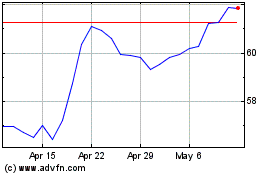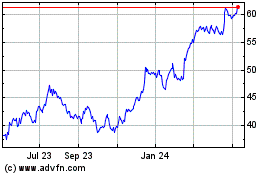Wells Fargo Struggles to Get Off the Municipal-Bond Blacklist
June 17 2018 - 8:29AM
Dow Jones News
By Heather Gillers and Emily Glazer
Some states and cities that do business with Wells Fargo &
Co. continue to steer clear of the bank when selling municipal
bonds to the public, the latest sign larger customers haven't
forgiven its sales-practices scandal.
New York City's leaders have a prohibition on bond deals with
Wells Fargo. California and Ohio both recently extended their own
limitations on doing business with the bank. Chicago shunned Wells
Fargo for a year and hasn't done a deal even after its ban
expired.
Wells Fargo's ranking among underwriters by volume fell to
eighth in this year's first quarter from third two years earlier,
before the scandal, according to Thomson Reuters data.
"There's no question that the business bans that came up two
years ago had an impact on our growth," said Phil Smith, head of
Wells Fargo's government and institutional banking group, which
includes municipal banking. But Mr. Smith said many clients are
giving the bank the "go ahead to compete for business."
Underwriting municipal bonds is a small part of Wells Fargo's
business, sitting within the bank's wholesale banking group.
Wholesale banking makes up around half of Wells Fargo's profits.
But the municipal-banking issues show the widespread impact of the
sales-practices scandal, which centered on its business with retail
customers.
Relationships with treasurers' offices around the country may be
hard to repair.
"The court of public opinion still weighs heavily on elected
officials," said Richard Ciccarone, president and chief executive
of Merritt Research Services LLC, a municipal-bond research firm.
When an underwriter's image is tarnished, he said "they can go into
the penalty box for a period of time."
The governments steering clear of Wells Fargo once produced a
stream of fees for the bank, documents show. New York City and
California issue billions of dollars in bonds annually, and fees
can run to as much as $2 million per deal, documents show. The lead
underwriter typically receives between 35% and 65% of the fee
amount, according to industry practices.
States first pulled their business soon after the bank's
sales-practices scandal erupted in September 2016. The bank later
said it opened as many as 3.5 million customer accounts without
their knowledge or authorization. That fall, Chicago and at least
four states approved temporary bans on certain business with the
bank, such as underwriting and investing, according to officials
and public records.
Mr. Smith said Wells Fargo has been meeting with officials in
Chicago and that he hopes to win business there soon.
In March 2017, Wells Fargo received a downgrade on its Community
Reinvestment Act rating. Several governments limit business with
banks deemed less than "satisfactory." New York City put its ban in
place in May 2017. This past February, Wells Fargo was hit with a
Federal Reserve asset cap for "widespread consumer abuses."
The state and local government bans typically prohibited Wells
Fargo from serving as lead underwriter and sometimes applied only
to negotiated deals. Some extended to schools like the University
of California and to airports including Midway and O'Hare in
Chicago, public officials said.
"We still have some pockets where bans are being renewed or the
worst part is, it's just hard to hire us," Mr. Smith said. "We keep
competing where we can and continue to provide them with ideas." He
added that the new tax law has reduced overall bond issuance.
Saving money has at times trumped public officials' qualms about
Wells Fargo. The bank underwrote three bond deals in California,
where laws require the use of the lowest bidder on competitive
sales. Seattle continued to bank with Wells Fargo after no other
firm showed interest in providing the city with depository
services. Florida welcomed Wells Fargo, which repeatedly underbid
competitors.
"My position on that has always been you ought to be making
business decisions on economics not politics," said Florida's state
bond director, Ben Watkins.
But Las Cruces, N.M., recently terminated Wells Fargo as the
bank handling the city's day-to-day banking needs, ending a roughly
15-year relationship. Ken Miyagishima, the mayor of Las Cruces,
said the decision to switch to U.S. Bank came after residents at
two council meetings expressed concerns about the bank's
practices.
"Never have I seen residents so inclined to come to a council
meeting to discuss who we bank with," Mr. Miyagishima said. "This
obviously was something they felt very passionate about."
--
Gretchen Morgenson
contributed to this article.
Write to Heather Gillers at heather.gillers@wsj.com and Emily
Glazer at emily.glazer@wsj.com
(END) Dow Jones Newswires
June 17, 2018 08:14 ET (12:14 GMT)
Copyright (c) 2018 Dow Jones & Company, Inc.
Wells Fargo (NYSE:WFC)
Historical Stock Chart
From Mar 2024 to Apr 2024

Wells Fargo (NYSE:WFC)
Historical Stock Chart
From Apr 2023 to Apr 2024
